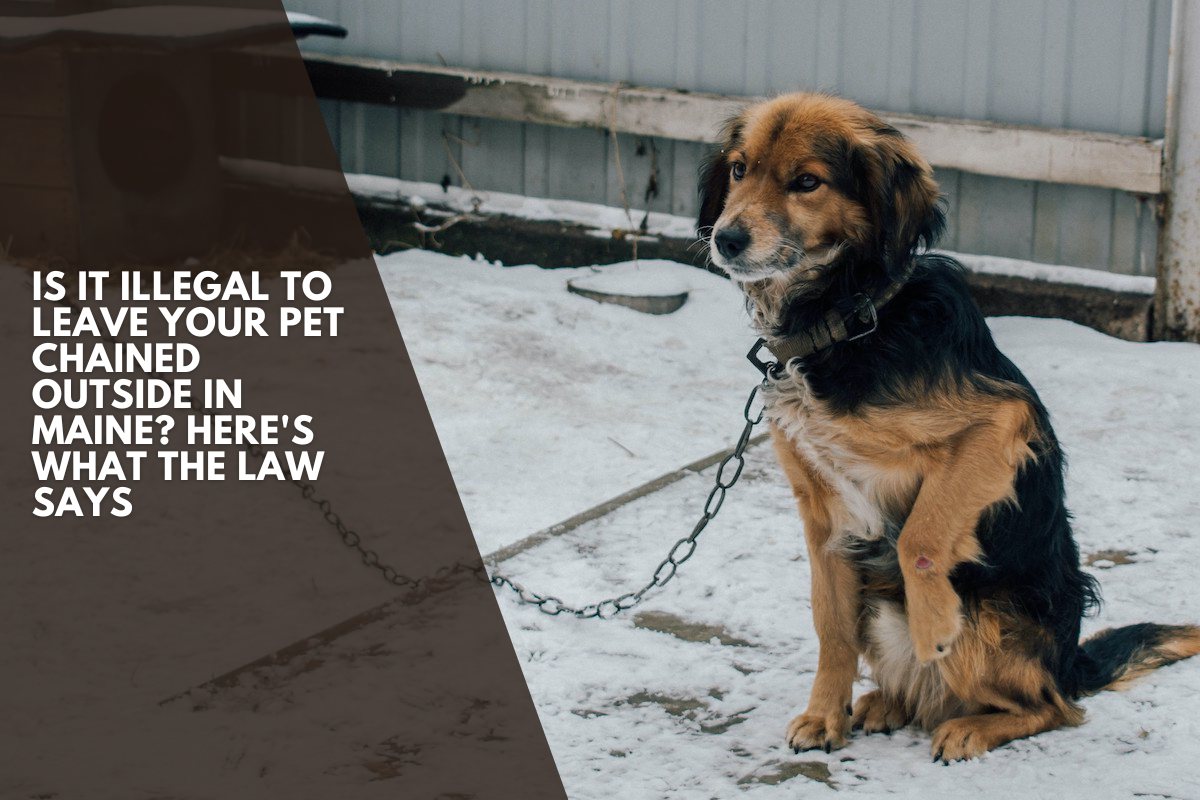In Maine, it is not outright illegal to leave your dog chained or tethered outside; however, there are specific laws and regulations designed to protect tethered dogs from harm and ensure their welfare. The state acknowledges that tethering can be used as a form of confinement but requires that it be done in a humane and regulated manner.
Key Requirements for Tethering Dogs in Maine
According to Maine law, if a dog is tethered outside as its primary means of confinement—meaning the dog is confined on a tether for more than 12 hours in a 24-hour period—there are strict standards that must be met:
The chain or tether must be attached using swivels or similar devices to prevent tangling or twisting.
It must be attached to a well-fitted collar or harness that does not cause injury or trauma.
For most dogs, the length of the tether must be at least five times the length of the dog (measured from the tip of the nose to the base of the tail). For sled dogs or competition dogs, the lengths differ slightly depending on the type of anchor.
The dog must have continuous access to proper shelter that is appropriate for Maine’s climate. This includes a shelter with three walls and a waterproof roof, sized correctly for the dog, and elevated above the ground to prevent dampness and cold.
The tethered dog must have unencumbered access to food, water, and shelter at all times.
Protection from Extreme Weather and Humane Treatment
Maine law explicitly protects dogs from being tethered outside unattended during hazardous weather conditions, such as extreme heat, cold, wind, rain, snow, or hail. The rationale is to prevent health risks like hypothermia, frostbite, or heat exhaustion.
The law states that inadequate shelter or signs of distress, such as continuous shivering for 10 minutes, indicate a violation. The use of inadequate shelters, like metal barrels, is not permitted under the law.
Enforcement and Penalties
Violations of Maine’s tethering laws can result in civil penalties of up to $100 for the first offense, with higher fines for repeat violations. Severe breaches of the law that cause harm to the dog may be prosecuted under animal cruelty statutes, which carry harsher consequences including fines and potential jail time.
Community Efforts and Reporting
Maine has a long history of activism around dogs chained for excessive periods without proper care. Organizations like the Maine Federation of Animal Advocates (MFOA) lead campaigns raising awareness and encouraging residents to report cases of neglect or abuse related to chained dogs. Reporting includes providing documentation to local animal control officers to help enforce the law effectively.
Summary
It is not illegal to tether a dog in Maine but strict laws govern how it must be done.
Chains must allow the dog enough length to move freely and must be attached to a proper collar or harness.
Proper shelter, food, and water must be accessible at all times.
Dogs cannot be tethered unattended in hazardous weather conditions.
Violating these requirements may lead to fines or, in more severe cases, animal cruelty charges.
Maine’s laws reflect a balance between allowing outdoor confinement of dogs and ensuring their humane treatment, with an emphasis on shelter, weather protection, and responsible care.
If you see a dog being tethered in a way that seems cruel or unsafe, you are encouraged to report it to local animal control for investigation.
This framework makes Maine’s approach to tethering one of the more progressive and detailed in the country, prioritizing the well-being of dogs while allowing responsible outdoor containment.
Sources
[1] https://mainelegislature.org/legis/bills/bills_123rd/billpdfs/HP086601.pdf
[2] https://www.peta.org/issues/animal-companion-issues/ordinances/maine/
[3] https://www.mfoa.net/activism-programs/mfoas-dogs-chained-life-25-year-campaign
[4] https://www.mainelegislature.org/legis/bills/bills_122nd/chapters/PUBLIC340-2.asp
[5] https://legislature.maine.gov/statutes/7/title7sec4015.html











